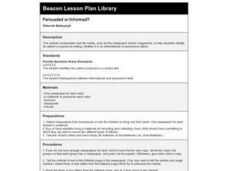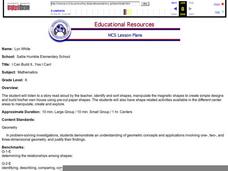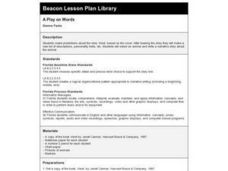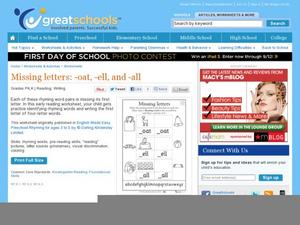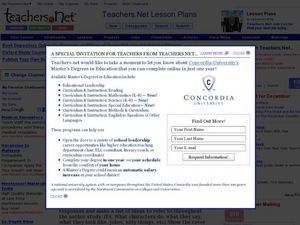Curated OER
Poetry of War and Peace
Students read and discuss the poem "In Flanders Fields," then write poems evoking images of peacetime. They practice the techniques of writing poetry while using textual imagery to create visual images.
Curated OER
A Fine Feathered Flock
Students role play different situations. In this respect lesson plan, students read Mr. Lincoln's Way, identify the story elements and answer comprehension questions. Students discuss how they can always treat others with respect and...
Curated OER
Elements of Poetry
Prepare your learners to identify figurative language in poetry. Tips for reading poetry and what to look for are listed on these slides. Rhetorical devices are defined and plenty of examples are given.
Crafting Freedom
Thomas Day's Letter to His Daughter, Mary Ann
Why is a letter a better way to learn about a person than a different primary source? Explore Thomas Day's ideas and advice to his daughter in a letter from 1851, which details the struggles of the American South before the Civil War....
Curated OER
Persuaded or Informed?
Give each learner a newspaper for this lesson! As a group, read select editorials and discuss them with your class. Are these articles informational or persuasive? Cut out select editorials and have learners identify the purpose of each...
Curated OER
Experiencing "Romeo and Juliet"
Ninth graders read and analyze the William Shakespeare play "Romeo and Juliet" and compare it to the 1996 modern version of the play and the movie "West Side Story." They write an essay comparing and contrasting the three versions.
Curated OER
The Breaking of Charity
The danger of mob mentality is on display in The Crucible by Arthur Miller. Get your class thinking with some challenging quickwrite questions, then assign characters from the play to be read aloud altogether. Links to worksheets for...
Curated OER
Defining Love
After reading and discussing Love Medicine by Louise Erdrich, pupils compare/contrast the concept/theme of love within several multiple pieces of literature. They must support their claims with textual evidence. In addition, they analyze...
Curated OER
My Secret War: Lesson 1
Fifth graders explore historical fiction. In this genre study lesson plan, 5th graders go on a text feature scavenger hunt to identify the parts of a historical fiction text. Additionally, students read the book, My Secret War and...
Sean Banville
New Year's Day
Focus on a passage about the new year with your English language learners. You can start with reading the passage aloud to your class, and then launch into the related activities. Pupils match phrases, complete cloze-style activities,...
Channel Islands Film
Dark Water: Lesson Plan 2 - Grade 3
A discussion of bioluminescence launches an investigation of animal adaptations. After re-watching the opening minutes of Dark Water, class members listen to a reading of What Do You Do with a Tail Like This, and then create a new animal...
Curated OER
I Can Build It.....Yes I Can!
Kindergartners listen to a story read by their teacher, then use magnetic shape pieces to construct simple designes. They "build" their own house using pre-cut paper shapes. This age-appropriate lesson would be an excellent choice for...
Curated OER
A PLAY ON WORDS
After making predictions about Janell Cannon's story Verdi, middle schoolers read through the book and make a new list of descriptions, personality traits, etc. They select an animal and write a narrative story about the animal, paying...
Curated OER
Growing Vegetable Soup
Students use children's literature in order to think about the concept of creating a garden. This is done through conducting simple research about types of plants that could be grown in the area and how to care for them. Then the garden...
Curated OER
Poetry In Song
Investigate poetry and song lyrics with your class. They will identify poetic elements in their favorite modern music. Then they will play their song choice aloud for their classmates.
Curated OER
Sink or Float?
Have your class explore density and buoyancy using this resource. Learners read the book Who Sank the Boat, and use several items, such as rubber balls, bottle caps, wood, and other household items to conduct an experiment. Using a tub...
Curated OER
Getting to Know You
After going over the five steps of the writing process, pupils fill out "Getting to Know You" worksheets. They trade papers with each other, and have the task of writing a descriptive paragraph about the person whose worksheet they...
Curated OER
Fact Families Lessons
Have you ever tried using arrays to help you teach the fact families that go with multiplication and division? If not, you should read this article! Some excellent and easy-to-implement ideas are presented, along with some good lessons...
Curated OER
Missing Letters: -oat, -ell, and -all
Beginning readers must solve for the missing letter in these spelling questions. There are three pairs of rhyming words here, each without an initial letter. They complete the word, and for the second box, draw a picture. The alphabet is...
Shakespeare in American Life
"We Few, We Happy Few": Motivational Speech in Henry V
Class members may "think themselves accurs'd" when they first hear of an assignment that asks them to create a motivational speech. After studying the Saint Crispin's Day speech from Shakespeare's Henry V; however, they will count...
Curated OER
I Can't Hear You
Students practice reading silently to become better readers. They each read a copy of the book, "Mr. Cricket takes a Vacation," from Carousel Readers. Each student explains why if everyone read aloud in class how distracting it would be...
Curated OER
Find Your Style
Students read a story and demonstrate their fluency and comprehension by retelling it to a partner. In this reading lesson plan, students follow a note taking sheet provided.
Curated OER
More Thousands
In this thousands activity, students fill in commas to numbers, read numbers, add numbers, and more. Students complete 7 sets of problems.
Curated OER
Robert Munsch: Author Study
Students study Robert Munsch's style of writing. In this literature lesson, students read many of Robert Munsch's books, write a list of the characteristics found in his books, and write or orally tell a story using some of these...






